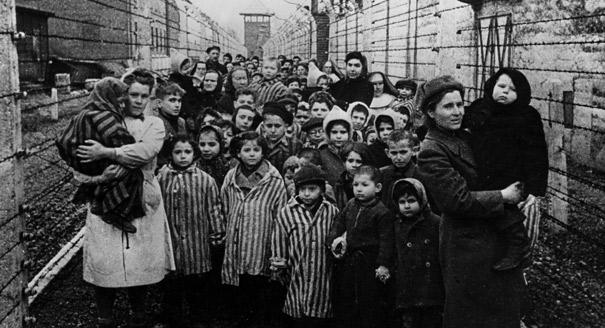In Russia, the proposed revision of the constitution has become a fight over history. One of the amendments on which Russians will vote at some point this year declares the right and obligation of the state to “protect historical truth.” It seems the establishment of a Russian equivalent of the “institutes of national remembrance” found in Eastern Europe will not be far behind.
All of this is part of the so-called “memory wars” that have made it increasingly difficult for Europe to have a proper conversation about the past, in particular World War II. Russians now feel as if they are being unfairly targeted in these memory wars.
The first new clash came in September 2019, when the European Parliament passed a resolution criticizing various countries for transgressions in their engagement with the past. Only Russia was identified by name. Russia, the resolution said, should repent for the responsibility which Soviet totalitarianism shared with Nazi totalitarianism for the outbreak of World War II and, by extension, all its horrors, the Holocaust included.
On January 27, the world marked the seventy-fifth anniversary of the liberation of Auschwitz, which is now marked as Holocaust Remembrance Day. The camp was liberated by the Red Army in 1945. Yet a joint statement by the presidents of the European Commission, European Council, and European Parliament in Israel to mark the anniversary said: “Seventy-five years ago, Allied Forces liberated the Nazi concentration camp Auschwitz-Birkenau. They ended the most abhorrent crime in European history, the planned annihilation of the Jews in Europe.” There was no mention of which army had actually freed the camp.
Some leaders who did acknowledge the Red Army’s role managed to do so by saying that Auschwitz was liberated by the troops of the First Ukrainian Front, a not-so-subtle implication being that the troops involved were Ukrainian. This was also a historical distortion. The Red Army’s fronts were named after the directions in which they advanced, not after the nationality of the soldiers involved.
Thirty years ago there was a spirit of dialogue and discovery in these historical debates. The late 1980s and 1990s saw state after state in Europe publicly admit complicity in the Holocaust. This was a kind of “critical patriotism,” which confronted the shameful chapters of a nation’s history without focusing exclusively on its national traumas or triumphs.
In that period the term Geschichtspolitik (the politics of memory) was coined in Germany to describe and condemn politicians’ self-serving interventions in history and collective memory. Yet in the 2000s, the concept reemerged in Poland as polityka historyczna but was given a positive meaning. Polityka historyczna leaves no room for dialogue or the search for shared interpretations of the past.
The result is that Eastern Europe’s approach to engagement with the past—where one’s nation is declared the greatest victim, and all blame for the darkest chapters of its history is assigned to others—has prevailed over the approach that Western Europe labored to develop from the 1960s on. All across the region, laws are being passed to protect national heroes from “slander,” i.e., charges of involvement in the Holocaust. To be sure, many national heroes died resisting Soviet rule. But that is no reason to forgive or forget their collaboration with the Nazis.
At the heart of today’s narrative is the notion of two totalitarianisms, from which all the twentieth century’s evils stem. All over Eastern Europe the emphasis is now much more on resistance to Soviet oppression than on the actions of authoritarian regimes, some of which were allied with Hitler before and during World War II.
In Hungary, for example, Budapest’s new mayor is planning to put up a memorial to female victims of wartime rape—above all, he says, at the hands of Red Army soldiers. Yet there is no memorial in the country to the many victims of soldiers of Nazi-allied Hungary on the eastern front. Nor is there such a memorial in Germany, just as there is no memorial to the 3.5 million Soviet prisoners of war who died in German captivity or the hundreds of thousands of Soviet forced laborers who perished during the war.
In 2008, the distinguished historians Michael Geyer and Sheila Fitzpatrick published a book which advanced the thesis that comparing Stalinism and Nazism is legitimate, but equating one with the other is not. That view now would prompt accusations of being a Putinversteher (Putin-empathizer).
Clearly, the old narrative of World War II was also based on omissions. It is only natural for Poles to be dismayed by references, which were not made before, to interwar Poland’s virulent anti-Semitism and its contribution to the Holocaust there, and reminders of how Red Army soldiers returning home were killed in Poland in 1945.
Many Russians, for their part, dislike being told that Red Army soldiers were not just liberators, but also committed atrocities. They do not want to hear about the many German women raped by Red Army soldiers.
Much about the history of World War II and our engagement deserves a new critical look. Far from righting wrongs, today’s memory wars do not bring us any closer to a complete truth, which will account both for events we should be proud of and episodes we should be ashamed of.
Like real wars, memory wars divide us into “us” and “them,” reducing “us” to victims and “them” to criminals. They discourage nuance and balance, making it impossible to confront omissions and distortions and giving rise to new ones. No one can win these wars. As a result we Europeans have lost each other’s trust, and a chance to examine the past self-critically.
This article was originally published in German in Frankfurter Allgemeine Zeitung.
